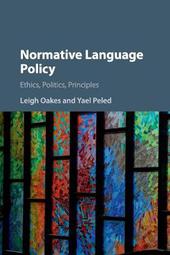
|
Normative Language Policy: Ethics, Politics, Principles
Paperback / softback
Main Details
| Title |
Normative Language Policy: Ethics, Politics, Principles
|
| Authors and Contributors |
By (author) Leigh Oakes
|
|
By (author) Yael Peled
|
| Physical Properties |
| Format:Paperback / softback | | Pages:202 | | Dimensions(mm): Height 150,Width 230 |
|
| Category/Genre | linguistics
Sociolinguistics |
|---|
| ISBN/Barcode |
9781316507643
|
| Classifications | Dewey:306.449 |
|---|
| Audience | | Professional & Vocational | |
|---|
| Illustrations |
7 Halftones, black and white
|
|
Publishing Details |
| Publisher |
Cambridge University Press
|
| Imprint |
Cambridge University Press
|
| Publication Date |
2 April 2020 |
| Publication Country |
United Kingdom
|
Description
Language politics in the new global era presents policymakers with significant ethical challenges. How should the reality of English as a global language influence the normative considerations underpinning national language policies? What moral arguments justify the imposition of national languages in an era of increased immigration and ethnolinguistic diversity? What role is there for non-dominant varieties in a globalised world? Building on the emerging notion of 'normative language policy', this book proposes an integrated framework for the study of such questions, combining recent normative work on language in political theory and philosophy with empirically-derived insight from the fields of sociolinguistics and applied linguistics. The case of Quebec forms the backdrop of the study, providing a particularly illuminating setting for investigating the common moral challenges that face contemporary polities seeking to maintain distinct linguistic identities, in an irreducibly diverse world increasingly dominated by English as a global lingua franca.
Author Biography
Leigh Oakes is Reader in French and Linguistics at Queen Mary University of London. His research focuses on language policy and planning, language and national identity, and language attitudes and ideologies, especially in the contexts of Quebec, France and Sweden. Yael Peled is a Postdoctoral Research Fellow in Language and Health at the Institute for Health and Social Policy and Faculty of Law at McGill University, Canada. Her research interests focus on the moral and political philosophy of language and the phenomenon of interdisciplinarity in academic research.
Reviews'Leigh Oakes and Yael Peled have written a book that changes the academic terrain in the field of language policy and planning. Their analysis of the history of language politics in Quebec is incisive and even-handed, revealing all of the complexities and elements that must be considered by political theorists who too often operate from abstract principles and universals at the expense of the role and effects of history and politics 'on the ground'. This book is ambitious in its aims and it delivers what it promises; it is required reading for anyone who wishes to better understand what is at stake when controversies involving language(s) arise in liberal democracies, and how we can better evaluate the risks and benefits of different approaches to dealing with those controversies.' Thomas Ricento, University of Calgary 'Discussions of language rights that traverse political theory and sociolinguistics are still rare. This book is an eloquent and timely contribution that addresses directly this troubling lacuna. In so doing, Oakes and Peled both demonstrate and exemplify the importance of strong interdisciplinary work in examining and addressing language rights, along with their social, political and policy implications. Highly recommended.' Stephen May, University of Auckland 'A highly valuable addition to the language policy literature. It offers a novel and original angle on a classic case, linking it up with the most recent and solid scholarship on the normative issues involved.' Francois Grin, Universite de Geneve, Switzerland 'Effective language policy must unite the findings of disinterested empirical research with the more general and cross-contextual insights of political philosophers. This book represents one of the first sustained attempts at finding common and complementary ground here.' John Edwards, St Francis Xavier University, Nova Scotia
|